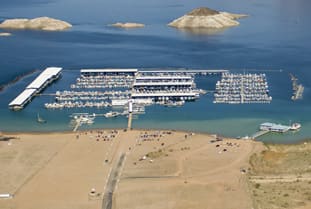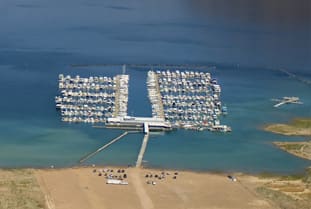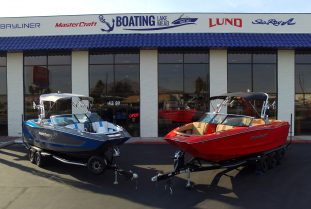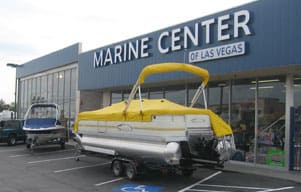In 2010, Las Vegas Boat Harbor, Inc was awarded the National Award of Marina of the Year for 2009 in the large category. This honor was bestowed upon the company and family by Marina Dockage magazine. The Marina Dockage magazine is a national publication in the marine industry. Betty Gripentog, founder along with granddaughter Erin Charlesworth and her husband, Coby Charlesworth traveled to Flordia to receive this prestigious award.
We thank our family of customers for being a part of this wonderful honor. Without our customers, guests, employees we would not be able to win this great award.
Below is the original article from Marina Dockage magazine, March 2010 publication in its entirety.

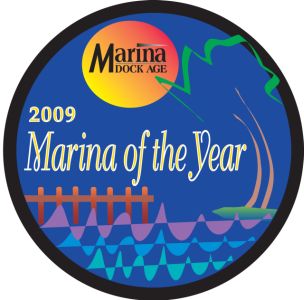
Family and tradition triumph at Las Vegas Boat Harbor
Las Vegas Boat Harbor Inc. in Henderson, Nev., has come a long way from where it started. When Bob Sr. and Betty Jean Gripentog purchased Las Vegas Boat Harbor in 1957, the marina had only a small dock, about 40 moorings, and five cottage-style trailers. Currently, it has nearly 1,500 wet slips, more than 350 dry storage spaces, two general stores, two restaurants, and a fleet of rental boats.
Las Vegas Boat Harbor (LVBH) has also literally moved a long way from its beginnings in Las Vegas Bay, about 15 miles to Horsepower Cove to be exact. In fact, the marina has moved many times to battle the ever-changing water levels of Lake Mead.
One thing that has always remained the same at LVBH is the Gripentogs. “It’s a family business and a family lifestyle. We enjoy working and playing with our business,” said Gail Kaiser, who was four when her parents bought the marina. She manages the facility with her three siblings, Bob Jr., Linda, and Gary and their spouses, and their children and their spouses. Even Bob Sr. and Betty’s four great-grandchildren can usually be found running around the marina.
Just as LVBH continues to add family members to its legacy, it has grown the facility considerably through the years as well. MDA would like to congratulate LVBH as the 2009 Marina of the Year for facilities with more than 250 slips. From its beginnings until LVBH grew to its current capacity in 2008, the owners have extended their family to many, many customers. The timeline on page 19 gives a brief history of the marina’s many changes.
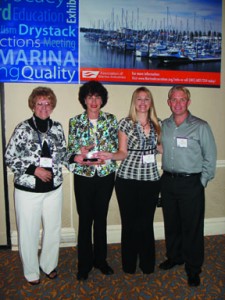
Customer service
The marina has undertaken many projects to improve the customer experience, often with the help of government funding. In 2008, with the help of a Clean Vessel Act grant, LVBH upgraded its pumpout facility.
Thanks to the help of the Boating Infrastructure Grant (BIG) program, LVBH has added many amenities, including an ADA-accessible, 62-foot by 27-foot floating restroom barge and a courtesy dock with power hookups that can accommodate up to eight 75-foot boats. And with another grant in the process, LVBH will be adding a second fuel dock and upgrading its existing fuel dock, which it hopes to complete this year.
In order to qualify for BIG money, projects must be geared toward transient boaters. The LVBH clientele is a mix of transient customers and monthly rentals. Because of its location and the type of boaters that frequent Lake Mead, LVBH felt it wanted to provide transient boaters with better services.
At a family-run facility, it’s no surprise that LVBH has created a family boating atmosphere that many customers return for each year. Erin Charlesworth, Kaiser’s daughter, said new customers are often surprised to see family behind the restaurant counters, waiting tables, pumping fuel, taking out the trash, or spending time with all the local customers.
“Our customers are not just customers, they are also our friends,” said Charlesworth. One of the ways LVBH hopes to personalize the marina experience for each customer and also help to forge those friendships is by hosting social events. “We don’t just run a marina. We like to play on the lake, too,” Charlesworth said.
LVBH hosts at least four annual parties each year. Boaters, including customers from neighboring marinas, come from all over Lake Mead to attend the marina’s biggest party at Halloween, where the friendly, family atmosphere takes center stage. One local group brings their huge houseboat, which it decorates into a Haunted Houseboat for anyone to tour.
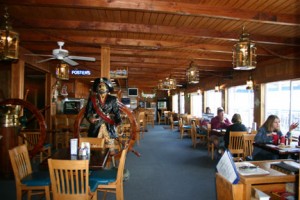
Marketing
Events like the Halloween Party also help draw people away from the area’s biggest attraction – the casinos – but LVBH must do other advertising as well to compete. It advertises in The Shopper, a local newsweekly, and places brochures in card racks all over southern California, Arizona, and Nevada. In addition, LVBH takes advantage of the many visitors to Las Vegas by establishing relationships with local concierge service providers. They refer many customers to the facility, and in return, LVBH will often sweeten the deal with special discounts.
With its rich history, though, word-of-mouth has been LVBH’s best form of advertising. LVBH also keeps in touch with its current customers through its quarterly newsletters, which include information about upcoming events, water/boating safety information, dock rule reminders, and any special deals at the time. LVBH stays in contact with their web-savvy customers through Facebook, and its page has nearly 270 fans.
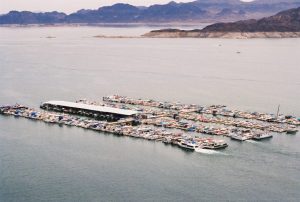
The many moves
One of the biggest challenges LVBH has faced throughout its long history has been the water level of Lake Mead. In 1964, the creation of nearby Lake Powell lowered Lake Mead water levels so much that LVBH made its first move to deeper water and then, moved back to its original location a year later.
In October 2002, LVBH made its most significant move to a new permanent location at Horsepower Cove in Hemenway Harbor. At that time low lake levels, along with encroaching silt, forced LVBH out of Las Vegas Bay. In fact, silt was encroaching nearly 10 feet a day, requiring the move to happen quickly. Since LVBH is part of the Lake Mead National Recreation Area, the National Park Service (NPS) had to approve the move. A process that would normally take three years, had to happen quickly in one year. “Once NPS realized that moving was the only answer, they got right onboard and helped us with the permitting,” said Kaiser.
It took 10 days to move the nearly 660-slip facility at full capacity. It was cut into four pieces, and at .5 mph, three big boats pushed and five smaller boats steered the dock sections to its new location where more than 200 anchors had to be reattached. LVBH chose its new location in part because another marina had been there in the 1960s. That meant the area had existing roads, and power and sewer infrastructures were at least in the vicinity. Overall, this lessened the impact on the national park. It took until May 2002 for LVBH to get power, but the marina never shut down. “Our customers always had access to their boats,” said Kaiser.
The family hoped the move to Horsepower Cover would be the end of its water level problems. However, Lake Mead water levels have continued to change drastically over the last eight years, forcing LVBH to temporarily move its docks farther out into the bay. In 2004, LVBH moved six times.
In severe drought conditions over the last several years, Lake Mead water levels have continued to drop. In April 2009, LVBH received notification that Lake Mead was predicted to drop 12 feet by June. Because one foot of water equals 18 to 20 feet of shoreline, LVBH had to move farther out into the water five times in the three months, moving as much as 85 feet each time.
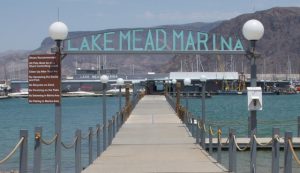
Buying the competition
LVBH was not the only facility struggling with Lake Mead water levels. In 2007, LVBH bought part of Lake Mead Marina, which was being pushed out of its cove, and moved the nearly 300-slip dock complex to Horsepower Cove. Lake Mead Marina was also running out of space and would have to permanently move closer to LVBH’s new location. LVBH helped Lake Mead Marina make the move in 2008 with the intention of buying the rest of the facility, rather than have their competitors as neighbors.
Most visitors to the Lake Mead area do their gambling in the Las Vegas casinos, but at the beginning of the economic meltdown in 2008, LVBH took a $10 million chance on a facility expansion. “Actually we really didn’t consider that it would ever fail,” said Kaiser, who also said the family put in a lot of planning hours to make sure the expansion was a success.
But it did take work. The facility itself was in need of some repairs. The restaurant was not up to health code standards. LVBH closed the restaurant and “scrubbed everything until it shined,” said Charlesworth. The docks also had rotten wood decking and exposed foam flotation that needed replacing. This has become an ongoing project throughout the entire complex. Whenever LVBH undertakes a project at the docks, it replaces the exposed foam with environmentally sensitive encapsulated foam pads.
Because of the dry heat, wood decking is difficult to maintain. For many years, LVBH has been steadily replacing its wood decking with either Trex® decking, which is made of recycled plastic and saw dust, or a metal decking from Premier Materials that is recycled steel with a PVC coating.
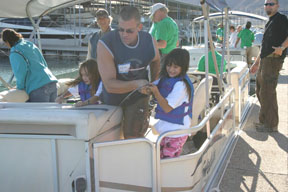
Community involvement
Somehow LVBH also finds time to help out the local community. One of the marina’s biggest yearly community events is helping out with C.A.S.T. for Kids, an organization that helps blind and/or handicapped children. The event brings local fish guides to the marina to help the children fish. LVBH donates pontoon boats to fish off and lunch for everyone. LVBH even got special permission from NPS to allow them to fish in the harbor, where catches are virtually guaranteed. All the children catch fish, and they leave with a trophy and picture.
In addition to hosting events for the community, LVBH invests its time in supporting local water safety as a participant in the Lifejacket Loaner for Kids program, sponsored by the Nevada Dept. of Wildlife and BoatU.S. “If someone comes in with a child without a lifejacket, we fit them properly and loan them one for the day,” said Kaiser.
In 2003, LVBH created safety videos for PWCs, along with the Nevada Dept. of Wildlife. “When we started with the boat rentals, Yamaha had a safety video about launching, but it didn’t go into the safety issues enough, especially for renters,” said Kaiser, who said the first thing they did was combine all the manufacturers’ videos into one. “We weren’t too sure how to make movies,” she said, but with the Dept. of Wildlife’s help, it became a reality.
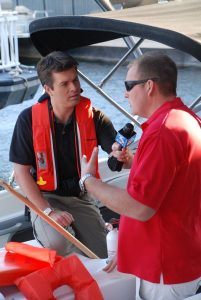
Industry involvement
The same year that LVBH developed the PWC safety videos, which are now available in six languages, the marina was instrumental in promoting a change in Nevada’s lifejacket laws. “We had a family law: lifejackets until you were 12. That was mom’s law,” said Kaiser, who said even with its rentals, LVBH always pushed mom’s law. Eventually, the family pushed for getting its family law into the state law books. “We got so much local support,” said Kaiser. Now, all children under the age of 12 must wear a lifejacket in a vessel underway, and lifejackets are required for all PWC users.
LVBH has also instituted other practices at their marina that were eventually employed by the local industry as a whole. In 1976, Bob Sr. built a breakwater out of car tires. “Everyone thought he was crazy,” Kaiser said. In fact, other marinas in the area called it ‘Gripentog’s Folly.’ The folly, though, became all their own. Many facilities along the West Coast now utilize similar tire systems as breakwaters. Not only do they use something that is otherwise hard to get rid of, but they also create fish habitat. The fish use it as a nesting ground. Instead of car tires, LVBH now uses tractor tires. “The bigger the tires, the more waves it will stop,” said Kaiser.
In 2000, Kaiser’s husband, John, developed an environmentally safe way to transport the fuel from its aboveground gas farm to the marina. The design was another example of LVBH’s initiative and desire to improve industry standards. In 2006, the Nevada Environmental Protection Agency (EPA) made this a regulation for all fuel facilities.
At LVBH, fuel must travel about 3,000 feet. In terms of fuel spills, the tanks, generally, do not present a threat. It’s the lines that carry the fuel to the marina that are the cause for concern. To protect the ground and water from leaking fuel, the concrete line containment raceway system has a concrete ditch with many catch basins along the way.
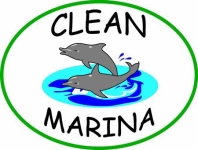
Environmental efforts
LVBH also looks after the environment, as much as it attends to the needs of customers. Charlesworth said her grandfather, Bob Sr., who passed away in an ultra-light plane accident in 1992, always taught his children and grandchildren about the importance of keeping Lake Mead a clean place. “Keeping the lake clean is one of our biggest responsibilities,” said Charlesworth.
To help accomplish that, LVBH joined the EPA’s Lake Mead Water Quality Forum in 1998, when a huge algae bloom affected the lake. “In trying to figure out why this was going on, the group started a public awareness campaign about Lake Mead water quality issues,” said Kaiser.
Though LVBH was merely a member of the public on that group, it became a leader in many other environmental efforts. Twice a year in the spring and the fall, LVBH invites local divers through the Las Vegas Dive Association to clean up the marina’s basin. At the Ecology Dives, LVBH supplies breakfast and a chili lunch for everyone. This past year, LVBH also partnered with NPS to bring in other local volunteers to do a shoreline clean up. Including the divers, about 100 people volunteered their time. “The divers find interesting things like outboard engines, things lost during storms, or things people lose over the docks,” said Kaiser.
To help curb the amount of debris that collects on the land and in the water, LVBH is part of a program called ‘Bag it in, bag it out.’ It supplies trash bags free of charge to the public, so they can bring their trash back from the beach. LVBH also uses simple practices like putting a second containment unit under all grease containers, using all biodegradable products in the restaurant, no Styrofoam, and the dry storage security guards use an electric golf cart.
Hopefully, these simple practices will help LVBH eventually achieve Clean Marina status. Because the state of Nevada does not have an official program, LVBH is working with the California program for Clean Marina certification. “We feel that we do a lot for the environment,” said Kaiser. “Hopefully, getting the certification will help promote environmentally friendly use of the lake. If you show people what you do, they will follow in your footsteps individually.” LVBH hopes to achieve certification this year.
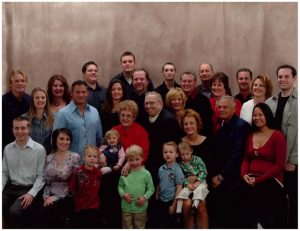
All about family
One of the other things Bob Sr. Gripentog also taught his family is to do kind things for people, not for the thank you, but because that’s just what you do. “With the teaching of Grandpa always echoing in our heads, we try to pass them to our employees and friends,” said Charlesworth.
That simple philosophy is evident in everything that LVBH does for its customers, the environment, the local community, and the Nevada boating industry. Whether its collecting lunches for the Ronald McDonald House sack lunch program, shuttling customers to their boats, or providing them with biodegradable bags to clean up after their pets, LVBH and its enormous family always provide unbelievable customer service and something a little extra. While most of its customers recognize LVBH as a top-notch facility, they also know they are part of the LVBH family.
“Some of our customers have been at the marina for more than 30 years. They have stuck with us through the easy times and through the hard ones,” said Charlesworth.
